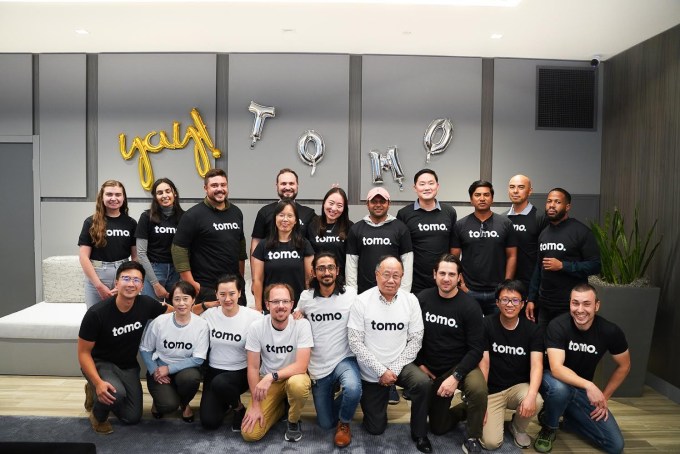Building credit history can be difficult if you are a consumer that is having trouble getting access to credit in the first place.
Enter TomoCredit, which has developed a credit card focused on building credit history for first-time borrowers. The San Francisco-based startup is announcing today that it has raised $10 million in a Series A funding round co-led by Kapor Capital and KB Investment Inc. (KBIC), a subsidiary of South Korea’s leading consumer bank. Lewis & Clark Ventures, AME Cloud Ventures, Knollwood Investment Advisory, WTI, Bronze and Square co-founder Sam Wen also participated in the Series A financing.
The new capital comes just over seven months after TomoCredit raised $7 million in seed funding, and brings its total raised this year to $17 million. The company also announced today it has appointed Ash Gupta, former CRO at American Express, to its board.
All the reasons why you should launch a credit or debit card
TomoCredit co-founder and CEO Kristy Kim came up with the concept for the company after being rejected multiple times for an auto loan while in her early 20s.
Kim, who immigrated to the U.S. from South Korea with her family as a child, was disappointed that her lack of credit history proved to be such an obstacle despite the fact she had a job “and positive cash flow.”
So she teamed up with Dmitry Kashlev, a Russian immigrant, in January of 2019 to create a solution for other foreign-born individuals and young adults facing similar credit challenges. That fall, the startup (short for Tomorrow’s Credit) was accepted into the Barclays Accelerator, powered by Techstars.
The fintech offers a credit card aimed at helping first-time borrowers build credit history, based on their cash flow, rather than on their FICO or credit report ratings. Its biggest differentiator, believes Kim, is that it has no fees, no APR and no credit pull. Traditional credit products rely heavily on fees and APR, she said, while TomoCredit makes money through merchant fees.
Image Credits: TomoCredit
TomoCredit is powered by Finicity (which was acquired by Mastercard last year), and leverages that company’s data network and open banking technology so that it can “securely” access applicants’ bank accounts to obtain financial data for underwriting purposes.
Once approved, applicants receive the TomoCredit Mastercard. The goal is to bring “millions of individuals that lack a credit score into the financial system, allowing a diverse group of consumers the opportunity to better position themselves as qualified candidates for mortgages, auto loans, or other major life purchases,” the company said.
TomoCredit has already pre-approved more than 300,000 customers and expects to issue a total of 500,000 cards by year’s end, according to Kim.
“We’ve grown 10x this year from the beginning of 2021,” Kim said. “Still, this round came together earlier than expected.”
Something that has been surprising to Kim is the interest from a variety of types of consumers.
“In the beginning, we thought international students and immigrants would be most interested in our product,” she told TechCrunch. “But after launching, we’ve realized that so many people can benefit — from gig economy workers to YouTubers to any young person who hasn’t had a chance to build credit yet. The market is way bigger than we even realized.”
In early 2022, the company plans to roll out the Tomo Black card, a product for some of its existing customers that “are showing good performance.” It’s currently testing it with some of its existing user base.
“This is a premium product that can grow with our customers, who we want to retain over the next 10 to 20 years,” Kim said. “We don’t want our product to be a stop-gap solution.”
Image Credits: TomoCredit
The startup plans to use its new capital to do more hiring and enhance features such as weekly autopay and high credit limits in an effort to “boost credit scores faster,” she added. Currently, TomoCredit has about 30 employees, up from 10 at the time of its last raise in February.
“My main focus is recruiting top talent,” Kim said, noting that the company had already hired “some senior people from Wells Fargo.”
“When we recruit and hire, we care about diversity,” she added. “We’re building products for people who have been traditionally underserved by major banks. I think to align with our mission, we should embody that in building our team. More than 50% of our execs are female. The entire risk team is female. We are diverse in terms of gender, age and ethnicity because we want to truly understand our customers and build a product that is inclusive.”
Brian Dixon, partner at Kapor Capital, points out that there are about 45 million people in the U.S. who should have credit scores, but cannot take out a loan, get a credit card, or apply for a mortgage. And that number is only increasing.
“When we learned that Kristy experienced these issues firsthand when she moved to the United States and thoughtfully figured out a way to circumvent the predatory and broken credit card system, it deepened our conviction in her and the product itself,” he wrote via email.
Dixon believes that TomoCredit’s model of not charging the user makes it a “safe and affordable alternative” to what is in the market.
“Their mission aligns with our thesis of closing gaps of access and opportunity in the credit space at large as well,” he added.